5. Tommy Lee Jones as Clay Shaw in JFK (1991)
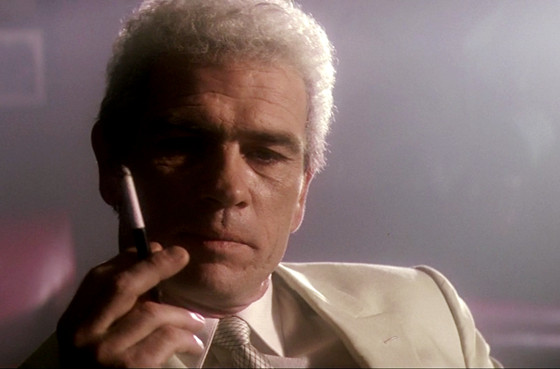
Arguably the most quintessentially Oliver Stone film. JFK is a rapid-fire examination of the aftermath of President Kennedy’s assassination. The film is more of a showcase for Stone’s filmmaking ability than it is history.
The film also contains one of the greatest scene stealing performances of recent memory in the form of Tommy Lee Jones’ Clay Shaw. Shaw is a homosexual Louisiana society man who’s is suspected of having something to do with the assassination.
Shaw is as ambiguous as the event the film attempts to document. He has very little screen time, yet he makes the most of it through his charisma and mystery. Most of Shaw’s story is not directly told to us. It is revealed through hazy flashbacks that may or may not be true that only add to the puzzle that he is.
Throughout his career, Jones has typically has played macho characters like his roles in the Men in Black franchise and The Fugitive. However, here, he is cast against type playing a character’s power comes from his sly, manipulative demeanor. How Jones lost the Oscar to Jack Palance is almost as mysterious as Shaw himself.
4. Willem Dafoe Srgt. Elias in Platoon (1986)
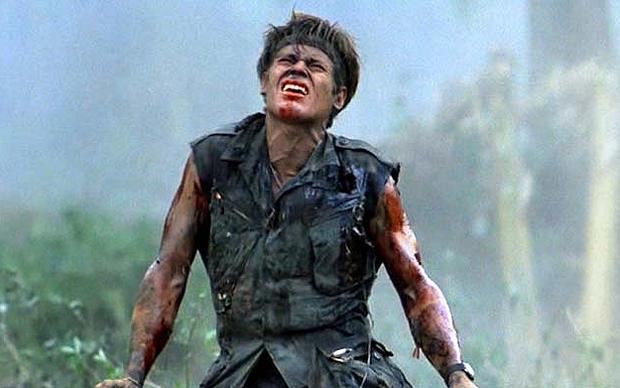
1986 was a great year for actors in Oliver Stone’s films. Along with Wood’s incendiary performance in Salvador, Platoon featured an all-star cast of actors among them Charlie Sheen and Tom Beranger (who just missed the cut for this list).
Though the most memorable performance is given by Willem Dafoe as Sgt. Elias. Most modern filmgoers typically associate Dafoe with darker sinister characters (i.e. The Green Goblin in the Spiderman films and J.G. Jopling in The Grand Budapest Hotel).
But early in his career Dafoe brought a unique understated quality to his characters. This aspect of his range perfectly contrasted Beranger’s volcanic Sargent Barnes.
In the film Dafoe plays the mentor of Charlie Sheen’s protagonist. He is a soldier who once had enthusiasm for war but has seen unimaginable horrors during his tour of duty and is view has been irrevocably altered.
Elias has adopted a fatalistic mentality towards Vietnam. Stone himself served in the war and even dropped out of college to enlist. Yet, as we have seen from the film, his attitudes going in and coming out probably differ dramatically. In this sense Elias mirrors Stone’s own experiences. Perhaps this is what Stone strived for in his direction of Dafoe.
Throughout the film, Elias’s ethics conflict with those of Sargent Barnes’. The two battle for supremacy among the soldiers with Elias inevitably being betrayed by Barnes and killed. Stone presents Elias as a Christ figure.
This is evident in his moral musings, his betrayal, and his death pose (arms spread-eagle). This is ironic considering Dafoe would later go on to play Jesus in Scorsese’s The Last Temptation of Christ. Nevertheless,
Dafoe brings a certain meditative quality to the role. He plays Elias as a tired soldier who has a definite sense of right and wrong. Dafoe perfectly captures the sense of loss that is present throughout the film and in the Vietnam War in genera. It is a loss that is resonates to this day.
3. Michael Douglas as Gordon Gekko in Wall Street (1987)
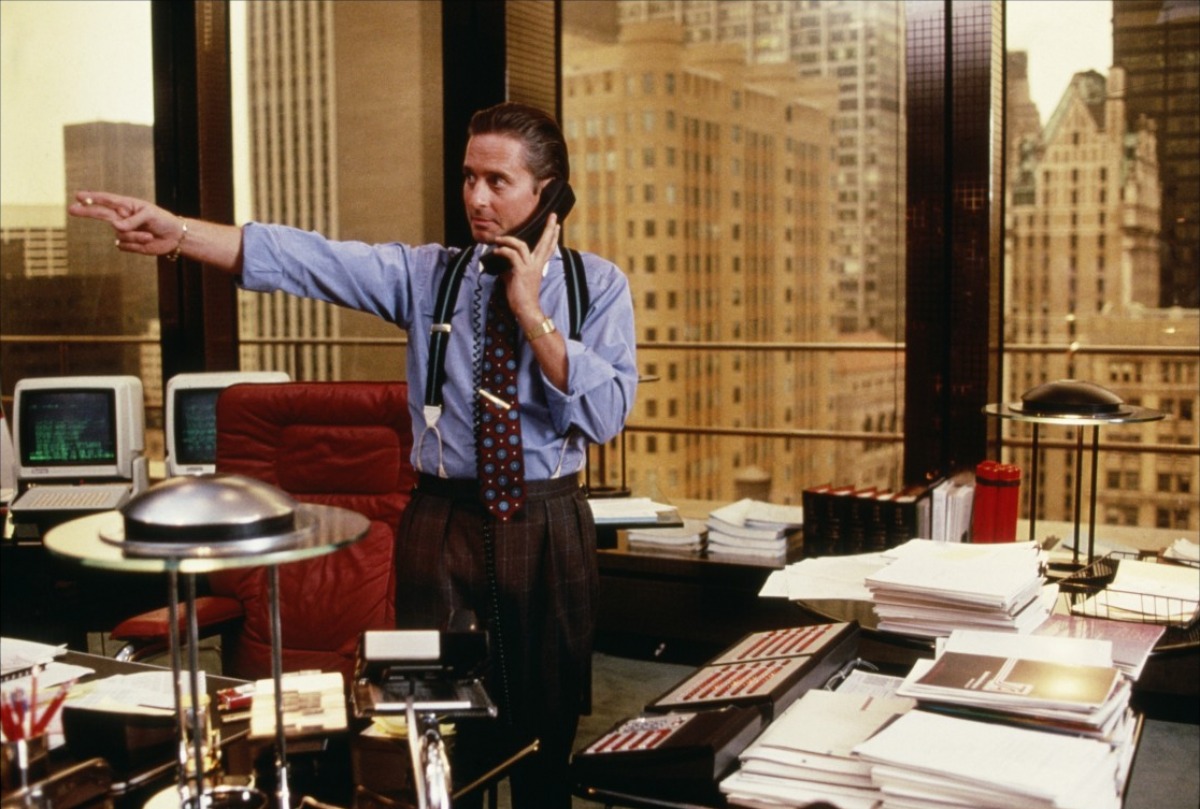
Though modern film audiences tend to think of Leonardo Dicaprio when they think of stockbrokers in film, the 1980’s lived and breathed Gordon Gekko. Michael Douglas’ career changed forever when he took on the challenge of playing Gekko.
Many people in Hollywood warned Stone against casting Douglas. He was seen as more of a producer than an actor. Nevertheless, Stone went with Douglas and he delivered. The oily haired, accessorized Gekko has come to represent the material excesses of the 1980s and it is thanks to Douglas’ effective portrayal that the film still resonates to this day.
Douglas plays Gekko as a modern day cowboy in the world of finance. He is as cutthroat as he is suave. His rhetoric and demeanor allow him to manipulate those around him.
His most famous speech at the shareholders meeting, which he culminated with his notorious line, “Greed is Good”, has become one of the most debated lines of all time because it speaks to the darker side of capitalism.
Therefore, Gekko, like most characters in Oliver Stone’s films, is a character that exists outside the realm of fiction. Douglas is able to convey the real life implications of Gekko’s mindset through his electrifying performance that unsurprisingly won him an Academy Award.
2. Tom Cruise as Ron Kovic in Born on the Fourth of July (1989)
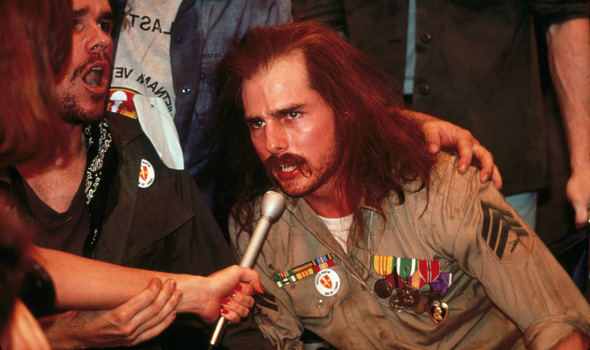
The Second of Stone’s Vietnam trilogy is arguably darker than Platoon. In Born on the Fourth of July, Tom Cruise guides the viewer on an emotional roller coaster in his portrayal of real life Vietnam War veteran Ron Kovic who enlisted in the war and like so many other Americans came home wounded. He was paralyzed.
Kovic still supported the war after being paralyzed. It was not until he connected with other wounded veterans that he saw the futility of war and decided to speak out against it. Cruise charts Kovic’s dramatic transformation from All-American high school student to an outspoken antiwar activist.
It is a performance of great physical acting as well. The viewer cringes as Kovic struggles with his day-to-day life in a wheelchair. The incredibly poignant scenes take place in the shabby Veterans Administration hospital. These scenes allow Cruise to capture Kovic’s disillusion.
At the time, Cruise was the hottest actor in Hollywood. Yet he chose to take this “unglamorous” role that showcased his emotions rather than his appearance. With his performance Cruise proved that he had the range and ability to illuminate Kovic’s many dimensions.
For his transfixing performance Cruise earned a Golden Globe and Oscar Nomination but ultimately lost to another wheelchair bound actor in Daniel Day Lewis in My Left Foot.
1. James Woods as Richard Boyle in Salvador (1986)
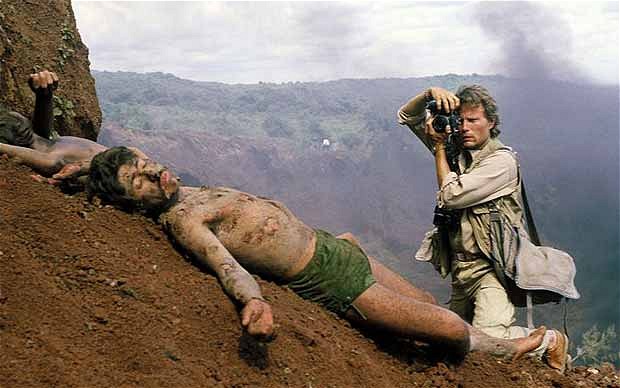
James Woods has come to be identified with fast-talking, slimy, amoral characters. However Woods never ceases to bring intelligence to his roles.
Whether he is playing a murder in The Onion Field to the CEO of Lehman brothers Dick Fuld in Too Big To Fail, Woods imbues his characters with an intense drive that few actors are capable of bringing to a role. In Oliver Stone’s look at the corruption behind the Salvadorian Civil War gave Woods the role of a lifetime in the form of real life journalist Richard Boyle.
Boyle is a road weary, drugged out reporter. The role is similar to the character of Raul Duke (i.e. Hunter S. Thompson) that Johnny Depp played in Fear and Loathing in Las Vegas in the sense that Boyle is a drug fueled gonzo journalist on an assignment. However, there is more to Boyle than just his vices. He is a person with desires that go beyond the base.
As the film progresses, he sees something larger than the story he is reporting on, the suffering of the citizens of El Salvador. Boyle passionately berates American officials for their anticommunist sentiment that is behind all the violence and suffering.
Boyle also meets Maria, a young, catholic, Salvadorian girl whom he falls in love with. His relationship with her proves to be the catalyst that puts him on the path toward moral transformation.
In one of the film’s best scenes, Boyle goes to confession for the first time in thirty-three years. Stone presents the priests view of Boyle as he confesses. As Boyle speaks to the priest there is a truth in his words that is rarely heard elsewhere in the film. He understands his daemons and his past but desires change.
This scene was reportedly all improvisation on the part of Woods. Woods guides the sleazy Boyle through a transformation to a humanist. This illustrates the depth and skill that Woods brought to the role. For his efforts, Woods gained his first, and only thus far, Best Actor Academy Award Nomination.
Author Bio: Casey is originally from Chicago. He is Junior at New York University majoring in Cinema Studies with a minor in Film Production. He hopes to go on to Graduate school and eventually work in some creative component of the film industry.